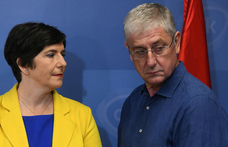Peter Hack: Make the justice system accountable!
The past days have seen yet another failure for the Hungarian justice system. It took 11 years for the Energol story, then the biggest oil scandal of thee century, to be concluded at the end of the 1990s with acquittals or light sentences for the accused. After the Tocsik and Postabank affairs, a cynical observer could be forgiven for assuming that things would end in this way.
Peter Hack © Horváth Szabolcs |
Will they consider whether it was right in 2005 to promote the judge in charge of the Energol affairs, given that this made it necessary to restart the inquiry, hearing witnesses and suspects once again, prolonging the affair for a further two years?
The initial ruling finds that the accused were not responsible for the duration of the proceedings. This means that the Hungarian state failed to fulfill its obligation under the European Convention on Human rights to deliver legal rulings within a reasonable period of time. So, if the accused turn to the European Court of Human rights, they stand a good chance of receiving compensation from the Hungarian state.
Whose mistake was it? Is anybody for the prosecutors' and the courts' mistakes, and if yes, do the taxpayers who paid for it all have the right to know the details? The question is even more justified, since the courts' budgets rose sevenfold between 1995 and 2006. There is scarcely another part of the state apparatus that has benefited from such munificence. Would asking whether this generous financing had really improved the workings of the courts truly constitute an attack on an independent judiciary?
These questions go far beyond the concrete instance mentioned above. They relate to the accountability of the justice system, the prosecutor's office and the courts. Unlike in most other countries, not only the courts in Hungary, but also the prosecutor is independent - and thus in effect irresponsible. And it's legitimate to ask whether the independence of the courts means they should be beyond all accountability. In other words, while there is a ilberal need for judicial independence, isn't there also a democratic need for accountability, which would lead to greater transparency and an enhance sense of responsibility?
We cannot stick to the practice of treating the activities of the courts and prosecutors as some kind of internal matter. We cannot allow the organs of the justice system to escape from all oversight by deferring to their independence.
PÉTER HACK
(The writer is a lawyer.)



















